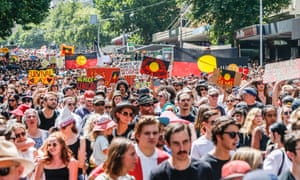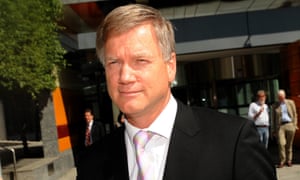'People are starting to understand': huge Invasion Day protest stuns Melbourne
'Invasion Day' protests in Australia - in pictures
Activist Gary Foley tells a crowd of up to 60,000 that ‘if we keep mobilising these numbers, governments cannot ignore us’
Bolt backs Matthew Guy's call for retaining Fake History
Just when we thought we’d escaped Bolt’s views on Australia Day, he took to the airwaves on Thursday to tell 2GB’s Chris Smith about the so-called cultural elite who were trying to ruin Australia Day by disparaging our history. Bolt says that after years of teaching schoolchildren that Australia has a history of racism, it was inevitable that the campaign to change the date would gain momentum.
Natural Justice
The prolific Sky News presenter and Herald Sun star blogger was expected back on board after Australia Day
but has had to delay his return to work as he “fell out of a tree”.
According to an internal email to Murdoch editors, Bolt broke three ribs
and injured a wrist after climbing the tree.Bolt ignores Zoologist advice not to feed the wild animals it kills them. Panahi says he loves them to death
“He loves bird life and magpies.” Panahi went on to reveal that Bolt often popped out to buy minced meat for the magpies that visited his garden because he loved to feed them.

Jeff Mc Mullen
January 26 2018.
Throughout my lifetime Aboriginal and Torres Strait Islander people have been seeking a Treaty process to recognise their sovereignty and create a pathway to justice. This should be our guiding principle. As sovereignty was never surrendered, it cannot be just for any Australian Government, Federal, State or Territory, to deny the First Peoples of this land a fair settlement of the historic disputes that have come from invasion, Frontier War, removal of children from family and ongoing dispossession in a land that had held them for sixty to eighty thousand years.
Australia’s political unwillingness to recognise a sovereign-to-sovereign relationship with our First Peoples through a Treaty process creates our 21st century reality which holds us back from justice. We have a political House of Cards that has no genuinely legal foundations. The deceit of terra nullius has been swept away by the High Court but we still behave as if two centuries of creeping dispossession and oppression have not occurred. If some of our ancestors were locked in a bloody Frontier War including massacres, why haven’t we ended the struggle with a Treaty as in all other British Commonwealth nations with First Peoples? The British Crown still rules us all in a Settler Society and all of our laws must be signed by the Monarch’s representative. Clearly the birth of an Australian Republic would signal a fresh beginning and an opportunity for justice but there is no just argument for delaying for another decade the inevitable historic settlement of the disputes with our First Peoples.
Australia’s current stance towards its First Peoples can still accurately be characterised as the so called “smoothing of the dying pillow”. This contends that the First Peoples are doomed and that they must surrender to oblivion, one way or the other. On the contrary, Aboriginal and Torres Strait Islander people retain strengths and resilience that should inspire us all. Their numbers approach roughly the size of their nations when Cook and Phillip and co first sailed these waters. Contrary to the deficit discourse and the negative reactions of our political leaders, the First Peoples continue to tear down the barbed wire of discrimination and racism, they kick open the doors that deny them equal education and employment, and they have put forward so many positive plans for a brighter future.
Certainly, our First Peoples remain dispossessed of their human rights, deeply disadvantaged, disempowered in all of the political decision-making that impacts their lives and discriminated against in so many tragic ways. As a consequence, our modern Australian nation is weakened at its core. This holds us back from genuine equality which we claim to cherish and it fails to see that one of our greatest strengths is the world’s most ancient multicultural diversity, based on the hundreds of distinct sovereign nations, with different languages and cultural practices, and an agreed social formula for co-existence that has demonstrated success for longer than anyone knows.
A Treaty is about recognition of this ancient sovereignty.
Furthermore, it is not for the First Peoples to beg at the table on the terms of negotiation. The two-faced treachery of Prime Ministers and Governments offers no historical assurance that any will listen and respond in good faith to the First Peoples.
If the First Peoples seek Treaties, then as that eloquent writer Eddie Gilbert argued, they must set out the terms because “the white man’ll never do it.”
The news that some NSW politicians are prepared to discuss a Treaty process here builds on the political reality taking shape in Victoria, South Australia and the Northern Territory. State Governments cannot claim to be listening to Aboriginal and Torres Strait Islander people without responding to the solutions brokered by local organisations that have the solid foundation of Traditional Law and Custom.
Treaty is not about separation, superiority of any culture or about white or black supremacy in terms of power. Indeed, it was such racist thinking that created the space between us in the first place, an exclusion of the First People that has lasted for almost two and a half centuries. Treaty is simply one of the best legal options, based on global evidence, to recognize the rights of First Peoples on the road to making things better.
In many other parts of the world where some 370 million First Nations people live today, a Treaty is viewed as an effective legal agreement to define certain important rights and relationships, a starting point for negotiations, and a powerful expression of the meaningfulness of those Indigenous laws and customs.
The rights of Native Americans have improved dramatically through a direct sovereign-to-sovereign negotiation process based on the relationships defined in more than 350 treaties.
Of all British Commonwealth nations with First People, Australia stands alone with a racist Constitution that permits discrimination and in the absence of a Treaty historic injustices continue unchecked. What a contrast to Canada where Section 35 of the Constitution recognizes Aboriginal people and reaffirms their Treaty rights.
This leads me to my major proposal. To end the continuing tragedy of the poverty and widespread inequality endured by our First People in their own land, a national Treaty framework should recognise Indigenous law and custom for each sovereign group of First Peoples, immediately settle the remaining Native Title claims stuck in the courts and also guarantee Aboriginal and Torres Strait Islander people the sub-surface mineral rights to the wealth of their lands. My logic is that the depths of poverty, welfare dependence, chronic illness, housing shortages, unemployment, over-incarceration and suicide impacting so many of Australia’s 750,000 Indigenous people, can only be overcome through a transformational shift of some of the bounty of this land that is rightfully theirs. Currently there are vast tracts of Commonwealth land that can be acquired by State Governments and sold off as they please. Although Indigenous people are viewed in Australian law as having title to about 30% of the landmass, in most cases they are not able to benefit through just compensation for the mining and other uses of their land and waters. Instead of another century of welfare dependency and poverty we need a transformational Treaty process that empowers the First People and establishes a democratically elected body that represents their interests, advises Governments and works on a collaborative plan for a brighter future.
The necessity for such a sovereign-to-sovereign relationship, expressed in a Treaty, is underscored by thirty years of evidence gathered by Professors Stephen Cornell and Joseph Kalt in the Harvard Project on American Indian Economic Development. I have not only spoken to these people and studied the evidence closely, I have seen the transformation of the lives of millions of Native Americans. The key, the Harvard evidence shows, is self-determination expressed through sovereign control of development decisions, a relationship and a negotiation process formulated through Treaties. This is the crucial missing element in Australia.
Around this country, I have sat with Aboriginal and Torres Strait Islander people for over 50 years. I am certain that I share their deepest belief that rather than minimalist and near meaningless incremental change, Australia needs a bold and hopeful process of Treaties with its First Peoples
January 26 2018.
Throughout my lifetime Aboriginal and Torres Strait Islander people have been seeking a Treaty process to recognise their sovereignty and create a pathway to justice. This should be our guiding principle. As sovereignty was never surrendered, it cannot be just for any Australian Government, Federal, State or Territory, to deny the First Peoples of this land a fair settlement of the historic disputes that have come from invasion, Frontier War, removal of children from family and ongoing dispossession in a land that had held them for sixty to eighty thousand years.
Australia’s political unwillingness to recognise a sovereign-to-sovereign relationship with our First Peoples through a Treaty process creates our 21st century reality which holds us back from justice. We have a political House of Cards that has no genuinely legal foundations. The deceit of terra nullius has been swept away by the High Court but we still behave as if two centuries of creeping dispossession and oppression have not occurred. If some of our ancestors were locked in a bloody Frontier War including massacres, why haven’t we ended the struggle with a Treaty as in all other British Commonwealth nations with First Peoples? The British Crown still rules us all in a Settler Society and all of our laws must be signed by the Monarch’s representative. Clearly the birth of an Australian Republic would signal a fresh beginning and an opportunity for justice but there is no just argument for delaying for another decade the inevitable historic settlement of the disputes with our First Peoples.
Australia’s current stance towards its First Peoples can still accurately be characterised as the so called “smoothing of the dying pillow”. This contends that the First Peoples are doomed and that they must surrender to oblivion, one way or the other. On the contrary, Aboriginal and Torres Strait Islander people retain strengths and resilience that should inspire us all. Their numbers approach roughly the size of their nations when Cook and Phillip and co first sailed these waters. Contrary to the deficit discourse and the negative reactions of our political leaders, the First Peoples continue to tear down the barbed wire of discrimination and racism, they kick open the doors that deny them equal education and employment, and they have put forward so many positive plans for a brighter future.
Certainly, our First Peoples remain dispossessed of their human rights, deeply disadvantaged, disempowered in all of the political decision-making that impacts their lives and discriminated against in so many tragic ways. As a consequence, our modern Australian nation is weakened at its core. This holds us back from genuine equality which we claim to cherish and it fails to see that one of our greatest strengths is the world’s most ancient multicultural diversity, based on the hundreds of distinct sovereign nations, with different languages and cultural practices, and an agreed social formula for co-existence that has demonstrated success for longer than anyone knows.
A Treaty is about recognition of this ancient sovereignty.
Furthermore, it is not for the First Peoples to beg at the table on the terms of negotiation. The two-faced treachery of Prime Ministers and Governments offers no historical assurance that any will listen and respond in good faith to the First Peoples.
If the First Peoples seek Treaties, then as that eloquent writer Eddie Gilbert argued, they must set out the terms because “the white man’ll never do it.”
The news that some NSW politicians are prepared to discuss a Treaty process here builds on the political reality taking shape in Victoria, South Australia and the Northern Territory. State Governments cannot claim to be listening to Aboriginal and Torres Strait Islander people without responding to the solutions brokered by local organisations that have the solid foundation of Traditional Law and Custom.
Treaty is not about separation, superiority of any culture or about white or black supremacy in terms of power. Indeed, it was such racist thinking that created the space between us in the first place, an exclusion of the First People that has lasted for almost two and a half centuries. Treaty is simply one of the best legal options, based on global evidence, to recognize the rights of First Peoples on the road to making things better.
In many other parts of the world where some 370 million First Nations people live today, a Treaty is viewed as an effective legal agreement to define certain important rights and relationships, a starting point for negotiations, and a powerful expression of the meaningfulness of those Indigenous laws and customs.
The rights of Native Americans have improved dramatically through a direct sovereign-to-sovereign negotiation process based on the relationships defined in more than 350 treaties.
Of all British Commonwealth nations with First People, Australia stands alone with a racist Constitution that permits discrimination and in the absence of a Treaty historic injustices continue unchecked. What a contrast to Canada where Section 35 of the Constitution recognizes Aboriginal people and reaffirms their Treaty rights.
This leads me to my major proposal. To end the continuing tragedy of the poverty and widespread inequality endured by our First People in their own land, a national Treaty framework should recognise Indigenous law and custom for each sovereign group of First Peoples, immediately settle the remaining Native Title claims stuck in the courts and also guarantee Aboriginal and Torres Strait Islander people the sub-surface mineral rights to the wealth of their lands. My logic is that the depths of poverty, welfare dependence, chronic illness, housing shortages, unemployment, over-incarceration and suicide impacting so many of Australia’s 750,000 Indigenous people, can only be overcome through a transformational shift of some of the bounty of this land that is rightfully theirs. Currently there are vast tracts of Commonwealth land that can be acquired by State Governments and sold off as they please. Although Indigenous people are viewed in Australian law as having title to about 30% of the landmass, in most cases they are not able to benefit through just compensation for the mining and other uses of their land and waters. Instead of another century of welfare dependency and poverty we need a transformational Treaty process that empowers the First People and establishes a democratically elected body that represents their interests, advises Governments and works on a collaborative plan for a brighter future.
The necessity for such a sovereign-to-sovereign relationship, expressed in a Treaty, is underscored by thirty years of evidence gathered by Professors Stephen Cornell and Joseph Kalt in the Harvard Project on American Indian Economic Development. I have not only spoken to these people and studied the evidence closely, I have seen the transformation of the lives of millions of Native Americans. The key, the Harvard evidence shows, is self-determination expressed through sovereign control of development decisions, a relationship and a negotiation process formulated through Treaties. This is the crucial missing element in Australia.
Around this country, I have sat with Aboriginal and Torres Strait Islander people for over 50 years. I am certain that I share their deepest belief that rather than minimalist and near meaningless incremental change, Australia needs a bold and hopeful process of Treaties with its First Peoples
Indonesians claim wrongful imprisonment over people smuggling offences
A group of 50 Indonesians who were jailed in Australia for crewing asylum seeker boats launch a bid for "significant" compensation from the Government for wrongful imprisonment.
Language test to blame for fewer migrants taking citizenship pledge, MP says






No comments:
Post a Comment